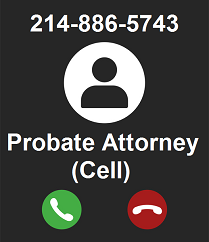Probate: 469.708.6050
Wills & Guardianship: 214.227.6400
13355 Noel Rd., Ste. 1100
Dallas, Texas 75240
Guide for the Texas Executor
An "executor" is the person named in a will who is responsible for administering the estate of the testator. By asking the court to appoint you as executor, you are agreeing to carry out the last wishes of a person who had the utmost confidence in you. It is a position of great trust, but it also comes with great responsibility.
Normally, so long as a person is not acting illegally, he or she is free to act in his or her self interests to the detriment of others. There are special relationships in the law, however, that dictate that a person, called a fiduciary, must put his or her interest behind those of another. An executor of an estate is a fiduciary and therefore there are certain duties that the executor must fulfill lest he or she be sued for a breach of the executor's fiduciary duties to the beneficiaries.
What follows is a short guide for our clients who will be or who have been appointed as the independent executor or administrator of the estate. It is not a substitute for legal advice and we expect that if you have any questions, you will call us.
Pre-Hearing Duties
Post-Hearing Duties
- Qualify as Executor
- Secure Real Property
- Take Possession of Vehicles
- Collect Tangible Personal Property
- Insure Assets
- Collect Financial Assets
- Inventory, Appraisement, and List of Claims
- Set Aside Assets for Spouse and Children
- Notify Beneficiaries
- Notify Creditors
- Act on Creditors' Claims
- Pay Taxes
- Distribute the Estate According to the Will
- Close the Estate
A video summarizing these steps is available on YouTube. Forgive the lack of editing as I do not charge enough for slick video production.
Video Summarizing Duties of an Independent Executor or Administrator
© 2014-2023 Duran Firm, PLLC
All rights reserved.













